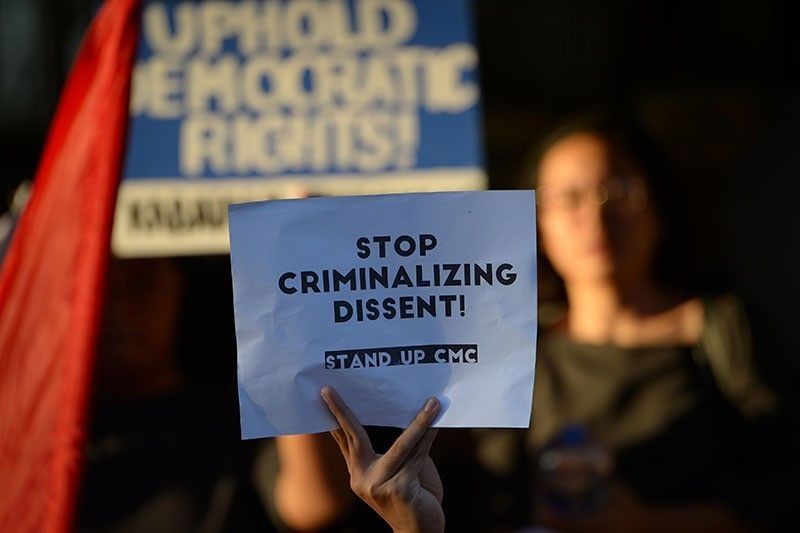
MANILA, Philippines — A senator proposed replacing imprisonment with fines as the penalty for libel cases involving journalists.
In Senate Bill No. 2521, submitted by Sen. Jinggoy Estrada on January 22, the lawmaker expressed concern that the existing legal framework, which poses the threat of imprisonment for journalists while they carry out their duties, is counterproductive and does not provide assistance during times when journalists are under attack.
“It is the duty of the State to afford ample protection to journalists, which, in turn, translates into adherence to a larger cause: the promotion of the Constitutionally-protected right to expression,” Estrada said in his explanatory note.
The senator cited the 2022 Global Impunity Index which ranked the Philippines as the seventh country in the world with 14 unsolved journalist murders.
He also mentioned the findings of the 2023 World Press Freedom Index, where the country’s rank climbed to 132 from 147.
“The 1987 Constitution guarantees freedom of the press but, in practice, Philippine law does not protect the free exercise of Journalism,” Estrada’s explanatory note read.
Instead of imprisonment, Estrada suggested a fine of P5,000 to P15,000 on any reporter, editor, or manager of a newspaper, daily, or magazine who publishes information related to someone’s private life that is offensive to their honor, virtue and reputation.
The legislation also includes community journalists, who work within specific regions, as well as publications or broadcasting outlets.
Libel, which is punishable under the Revised Penal Code (RPC), is defined as “public and malicious imputation of a crime, or of a vice or defect, real or imaginary, or any act, omission, condition, status or circumstance tending to cause the dishonor, discredit or contempt of a natural or juridical person or to blacken the memory of one who is dead.”
If found guilty, an individual may be imprisoned from six years to six months or a fine ranging from P200 to P6,000 pesos, according to the RPC. This penalty is separate from the civil damages an individual may file against an accused.
However, if libel is committed in cyber space, a case can be lodged under the Anti-Cybercrime Prevention Act of 2012, which stipulates that the penalty for libel will be one degree higher.
Estrada’s proposed bill, meanwhile, recommended a fine of P10,000 to P30,000 replacing the fines mentioned in the RPC.
He also proposed the shortening of the prescription period of libel from one year to six months.
RELATED: SC: Prescription period for cyber libel is 1 year, not 12,15 years
In October last year, the Supreme Court (SC) issued Administrative Circular No. 08-2008, which set the guidelines for a “preference” of imposing a fine as a penalty for libel instead of imprisonment.
Often abused
The lawmaker also mentioned the RPC provision concerning the venue where the libel case is committed has been abused by individuals.
“This system is often abused by subjects of news articles, causing unnecessary harassment and inconvenience to journalists and media organizations. They file suits in distant locations, leading to unjust imprisonment or bail, even if the cases are later dropped, resolved, or dismissed,” Estrada said.
He suggested that cases should be lodged in the regional trial court of the province or city where the principal office or business premises are situated.
Estrada referred to the provision of the RPC where a public officer can file a libel case in a “court of first instance” in Manila if their office is located in Manila and the provision where private individuals can file a libel case where they discovered the libelous claims.
Since 2004, during his initial term as a senator, Estrada has consistently pushed for the decriminalization of libel and reintroduced the bill in the subsequent 14th, 15th, and 16th Congresses.
Both libel and the provision of the Anti-Cybercrime law penalizing libel were also flagged by the United Nations Special Rapporteur for freedom of opinion and expression Irene Khan as it gives a “chilling effect” to journalists.
She also said that the Philippines is still a dangerous country for journalists as the killings of media workers persist.
Since the start of the administration of President Ferdinand Marcos Jr., the National Union of Journalists of the Philippines logged at least 109 incidents of attacks and threats against media workers.
Media watchdog Center for Media Freedom and Responsibility, meanwhile, said in May 2023 that 10 cases of libel and cyber libel have been recorded since the start of the Marcos administration.
On December 5, a petition before the SC was filed by former vice presidential aspirant Walden Bello, asking the high court to declare libel being a criminal offense as unconstitutional. — Ian Laqui
*****
Credit belongs to: www.philstar.com
 Atin Ito First Filipino Community Newspaper in Ontario
Atin Ito First Filipino Community Newspaper in Ontario






